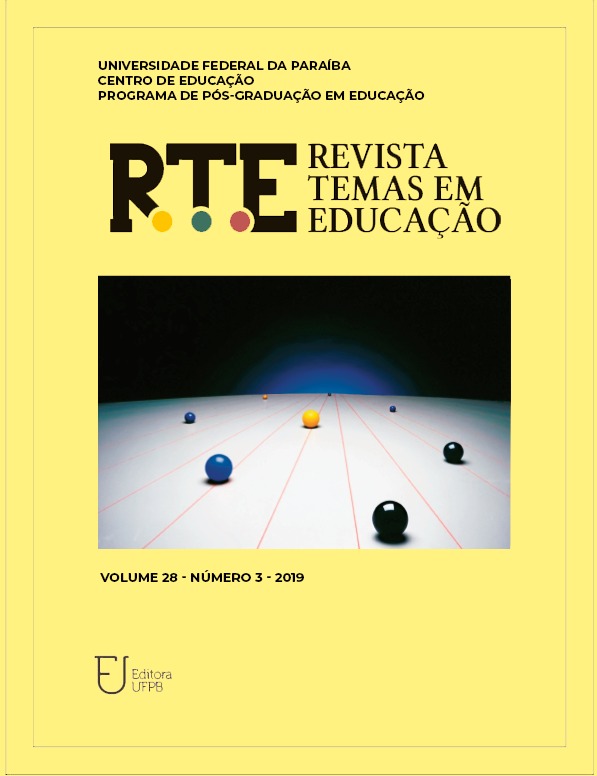REFRAMES OF INCLUSION BEYOND INSERTION. TECHNOLOGY, DIGITAL INCLUSION AND CITIZENSHIP AND THE ROLE OF THE HISTORY TEACHER IN THE CLASSROOM
REFRAMES OF INCLUSION BEYOND INSERTION. TECHNOLOGY, DIGITAL INCLUSION AND CITIZENSHIP AND THE ROLE OF THE HISTORY TEACHER IN THE CLASSROOM
DOI:
https://doi.org/10.22478/ufpb.2359-7003.2019v28n3.47981Keywords:
Digital inclusion, Information and Communication Digital Technology, Social inclusion, CitizenshipAbstract
This study aims to discuss the contribution of the use of digital technologies in the teaching of History for the digital and social inclusion of students. Based on authors such as Bonilla (2005); Bonilla and Pretto (2011); Bonilla and Oliveira (2011); Lemos (2007; 2011); Castells (2002, 2003, 2005) and Bittencourt (2011), the text addresses the need for the critical insertion of technologies in the teaching of History as a requirement for digital inclusion to take place. This work discusses the different understandings of the term digital inclusion, from the point of view of some authors and governmental programs, as well as the relationship between the concepts of digital inclusion, social inclusion and citizenship, closely intertwined. The research, of a bibliographic nature, aims, finally, to take a citizen perspective of digital inclusion, positioning itself by the defense of a digital inclusion that enables the conscious and authorial use of the technologies by the learner, making the teaching of History more meaningful and appropriate with the demands of the age of knowledge.
Downloads
References
ARAÚJO, Eliany Alvarenga de. Informação, sociedade e cidadania: gestão da informação no contexto de organizações não-governamentais (ONGs) brasileiras. Ciência da Informação, Brasília, v. 29, n. 2, p. 155-167, maio/ago. 1999.
ASSMANN, Hugo. A metamorfose do aprender na sociedade da informação. Revista Ciência da Informação, Brasília, v. 29, n. 2, p. 07-15, maio-agosto/2000. Disponível em: http://www.scielo.br/pdf/ci/v29n2/a02v29n2>. Acesso em: 10 fev. 2019.
BONILLA, Maria Helena Silveira. Escola aprendente: para além da sociedade da informação. Rio de Janeiro: Quartet, 2005.
______ ; OLIVEIRA, Paulo C. S de. Inclusão digital: ambiguidades em curso. In: BONILLA, Maria H. S.; PRETTO, N. de Luca (Orgs.). Inclusão digital: polêmica contemporânea. Salvador: EDUFBA, 2011, vol. 2, p. 23-48.
______ ; PRETTO, Nelson de Luca. Apresentação. In: BONILLA, Maria Helena Silveira; PRETTO, Nelson de Luca (orgs.). Inclusão digital: polêmica contemporânea. Salvador: EDUFBA, 2011, p. 09-13.
BRASIL. Decreto nº 7.175, de 12 de maio de 2010. Institui o Programa Nacional de Banda Larga - PNBL; dispõe sobre remanejamento de cargos em comissão; altera o Anexo II ao Decreto no 6.188, de 17 de agosto de 2007; altera e acresce dispositivos ao Decreto no 6.948, de 25 de agosto de 2009; e dá outras providências. Disponível em: <http://www.planalto.gov.br/ccivil_03/_Ato2007-2010/2010/Decreto/D7175.htm>. Acesso em: 14 fev. 2019.
______. Decreto nº 3.294, de 15 de dezembro de 1999. Institui o Programa Sociedade da Informação e dá outras providências. Disponível em: <http://www.planalto.gov.br/ccivil_03/decreto/D3294.htm>. Acesso em: 13 fev. 2019.
______. Decreto nº 5.542, de 20 de setembro de 2005. Institui o Projeto Cidadão Conectado - Computador para Todos, no âmbito do Programa de Inclusão Digital, e dá outras providências. Disponível em: <https://www.planalto.gov.br/ccivil_03/_Ato 2004-2006/2005/Decreto/D5542.htm>. Acesso em: 18 fev. 2019.
______. Lei nº 12.965, de 23 de abril de 2014. Estabelece princípios, garantias, direitos e deveres para o uso da Internet no Brasil. Disponível em: http://www.plan alto.gov.br/ccivil_03/_ato2011-2014/2014/lei/l12965.htm. Acesso em: 02 mar. 2019.
CASTELLS, Manuel. A sociedade em rede. São Paulo: Paz e terra, 2002.
______. O caos e o progresso. Entrevista. 2005. Entrevistadora: Keli Lynn Boop. Disponível em: <http://www.extraclasse.org.br/edicoes/2005/03/o-caos-e-o-progresso>. Acesso em: 23 fev. 2019.
CASTELLS, Manuel. Internet e Sociedade em Rede. In: MORAES, Dênis de (Org.). Por uma outra comunicação: mídia, mundialização cultural e poder. Rio de Janeiro: Record, 2003. p. 255-287.
COELHO. Franklin Dias. A cidade digital e a apropriação social da inovação tecnológica. In: SILVEIRA, Sérgio Amadeu da (Org.). Cidadania e redes digitais. São Paulo: Comitê Gestor da Internet no Brasil: Maracá – Educação e Tecnologias, 2010. Disponível em: <http://www.cidadaniaeredesdigitais.com. br/_files/livro.pdf>. Acesso em: 20 fev. 2019.
FREIRE, Paulo. Pedagogia da autonomia. São Paulo: Paz e Terra, 2000.
LEMOS, André. Cidade digital: portais, inclusão e redes no Brasil. Salvador: EDUFBA, 2007.
______. Prefácio. In: BONILLA, Maria Helena Silveira; PRETTO, Nelson de Luca (orgs.). Inclusão digital: polêmica contemporânea. Salvador: EDUFBA, 2011. pp. 15-21.
LÉVY, Pierre. A inteligência coletiva. São Paulo: Edições Loyola, 1998.
LIRA, Bruno Carneiro. O professor sociointeracionista e @ inclusão escolar. Editora Paulinas, 2010.
ONU. Resolução A/HRC/32/L.20. 2016. Disponível em: <http://www.un.org/ga/ search/view_doc.asp?symbol=A/HRC/32/L.20>. Acesso em: 20 fev. 2019.
Downloads
Published
How to Cite
Issue
Section
License
Authors who publish in this journal agree to the following terms:
. Authors retain the copyright and grant the journal the right to first publication, with the work simultaneously licensed under the Licença Creative Commons Attribution that allows the sharing of the work with acknowledgment of authorship and initial publication in this magazine. . Authors are authorized to assume additional contracts separately, for non-exclusive distribution of the version of the work published in this journal (eg, publishing in institutional repository or as a book chapter), with acknowledgment of authorship and initial publication in this journal.
. Authors are permitted and encouraged to publish and distribute their work online (eg in institutional repositories or on their personal page) at any point before or during the editorial process, as this can generate productive changes, as well as increase impact and citation of the published work (See O Efeito do Acesso Livre).



















